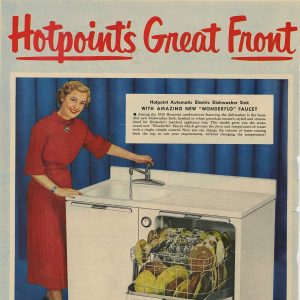
Image 1: Original inappropriate poster
The above poster is a classic 1950s dishwasher advertisement before which the upcoming 1960s women’s movements about gender equality haven’t drawn much attention. The blatant sexism was not a rare thing then and it’s not hard to think about where the offensive dishwasher joke came from. Somehow when it comes to house chores such as washing clothes or dishes, television or media tend to depict women the role of doing such chores. “Ohh, my clothes are dirty, I will just take it off and toss around. My wife/girlfriend will do it eventually”, “Ohh, I had such a great dinner. I will just leave the table, watch TV and let my wife/girlfriend clean up all the mess.” When I look into this poster, I see piles of dishes are loaded into the dishwasher and a blonde woman standing aside is pretty happy and satisfied with what she just did. No matter it is intentional or inadvertent, it looks like the society has taken this phenomenon for granted for a long time. Why are women traditionally connected with house chores or other trivial things? I personally think that society subconsciously concludes that women belong to the kitchen or laundry room because of their financial inabilities of supporting families. The long-term institutionally sexism makes women have fewer career opportunities and thus lower incomes. Men are dominant towards job promotions or career opportunities, and they spontaneously think that women should do house chores because they make more money. However, back then women didn’t have many choices. Potential jobs with high incomes were not prepared for women.
The meaning behind this poster is disturbing. When sexism prevails, the outcomes become part of our culture and people take it for granted. Imagine what young girls would think about it when they saw this kind of advertisement every day back then. The society is indoctrinating females on how to be a “good wife” by washing dishes or doing laundry. When people are not aware of the sexism that permeates our daily lives, the young generation of women are harder to defend their rights and request for gender equalities.

Image 2: Jammed
What I want to promote is the convenience that a dishwasher brings to a family. It’s definitely not just women’s jobs to do house chores. Also, it’s worth mentioning that there are not just posters for heterosexual families, and I’d definitely prepare posters featuring homosexual families. I featured a picture in which the husband kisses the wife. The dishwasher is definitely a good invention which liberates people from the hassle of cleaning up dishes. However, cleaning up dishes is definitely not an exclusive work for women. I emphasize the concept of family in this poster. Imagine how easier life is going to be after a family buys a dishwasher. After having a wonderful dinner with families, people can just shove dishes into a dishwasher whilst taking a sip a coffee.
I try to redefine the meaning of this poster to promote gender equality and raise the public’s awareness of it. Women should not be chained to the kitchen and exclusively do house chores while husbands take it for granted. We need to change the impression that it’s women’s jobs when we talk about doing laundry, cleaning up dishes or other house chores. It’s definitely just for female adults but also for young girls. Promoting gender equality makes young girls aspire to be independent but not just an attachment to males. I sincerely hope our new generation won’t relate women to house chores automatically when we talk about it. The new media plays an essential role in promoting gender equality, and we pray there won’t be such blatant sexism again. We still have a long way to go.